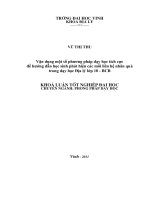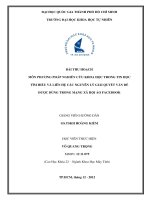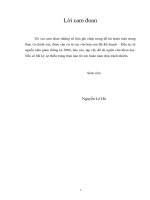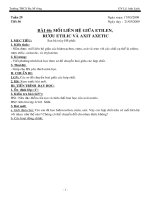Nghe hiểu mối liên hệ các ý trong bài thi TOEFL iBT docx
Bạn đang xem bản rút gọn của tài liệu. Xem và tải ngay bản đầy đủ của tài liệu tại đây (114.57 KB, 4 trang )
Nghe hiểu mối liên hệ các ý trong bài thi
TOEFL iBT
Một số câu hỏi thuộc dạng này:
· What is the likely outcome of doing procedure X before
procedure Y? (Nếu tiến hành quá trình X trước quá trình Y có thể
dẫn đến kết quả gì?)
· What can be inferred about X? (Có thể suy ra điều gì về X?)
· What does the professor imply about X? (Vị giáo sư có ngụ ý gì
về X?)
Lời khuyên:
Tư duy logic, khả năng suy luận và hiểu biết về lĩnh vực đang
được đề cập sẽ là chìa khóa giúp bạn ghi điểm trong phần thi này.
Như vậy để chuẩn bị tốt cho phần thi nghe, việc bổ sung kiến thức
nền (background knowledge) có vai trò quan trọng không kém gì
việc rèn luyện kỹ năng xử lý bài thi.
Ví dụ:
Professor: Ok, Neptune and it’ moons. Neptune has several
moons, but there’s only … we’ll probably only worry about two of
them, the two fairly interesting ones. The first one’s Triton. So you
have this little struggle with the word Titan which is the big moon
of Saturn and the name Triton which is the big moon of Neptune.
Triton it’s the only large moon in the solar system to go
backwards, to go around is what we call its parent planet, in this
case Neptune, the wrong way, Ok? Every other large moon orbits
the parent planet in the same counterclockwise direction… same as
most of other bodies in the solar system. But this moon …the
reverse direction, which is perfectly OK as far as the laws of
gravity are concerned. But it indicates some sort of peculiar event
in the early solar system that gave this moon a motion in contrast
to the general spin of the raw material that it was formed from.
The other moon orbiting Neptune that I want to talk about is
Nereid [NEER ee ihd]. Nereid is, Nereid has the most eccentric
orbit, the most lopsided elliptical type orbit for a large moon in the
solar system. The others tend more like circular orbits.
… Does it mean that the planet Pluto and Neptune might have been
related somehow in the past and then drifted slowly into their
present orbits? If Pluto … did Pluto ever belong to the Neptune
system? Do Neptune’s moons represent Pluto type bodies that have
been captured by Neptune? Was some sort of …was Pluto the
object that disrupted the Neptune system at some point in the past?
It’s really hard to prove any of those things. But now we’re staring
to appreciate that there’s quite a few junior Plutos out there. Not
big enough to really call a planet, but large enough that they’re
significant in history of the early solar system. So we’ll come back
to those when we talk about comes and other small bodies in the
fringes of the outer solar system.
Question:
What does the professor imply about the orbits of Triton and
Nereid?
They used to be closer together
They might provide evidence of an undiscovered planet
They might reverse directions in the future
They might have been changed by some unusual event
Key: They might have been changed by some unusual event
Giải thích:
Trong các câu hỏi dạng này bạn sẽ phải dùng thông tin từ những vị
trí khác nhau trong bài nghe. Ở ví dụ này, vị giáo sư miêu tả the
orbit of Triton and Neird. Trong cả hai trường hợp ông đều nói
đến những trường hợp có thể xảy ra trong hệ mặt trời trước kia,
những trường hợp mà có lẽ đã làm thay đổi hay phá vỡ những quỹ
đạo của chúng. Như vậy đáp án chính là phương án lựa chọn thứ 4:
“They might have been changed by some unusual event.”








